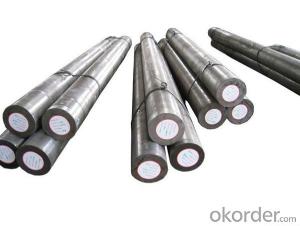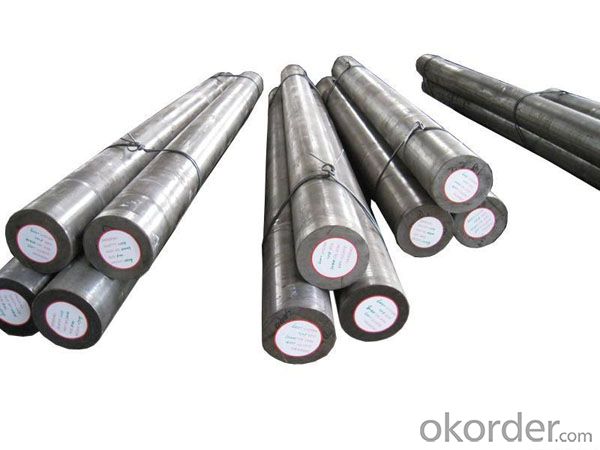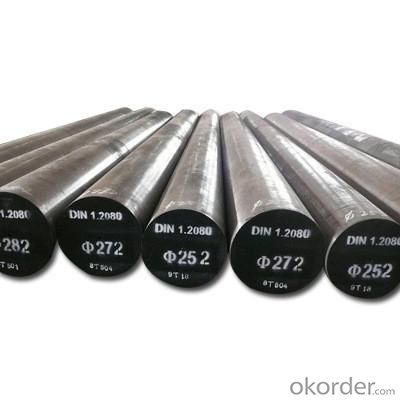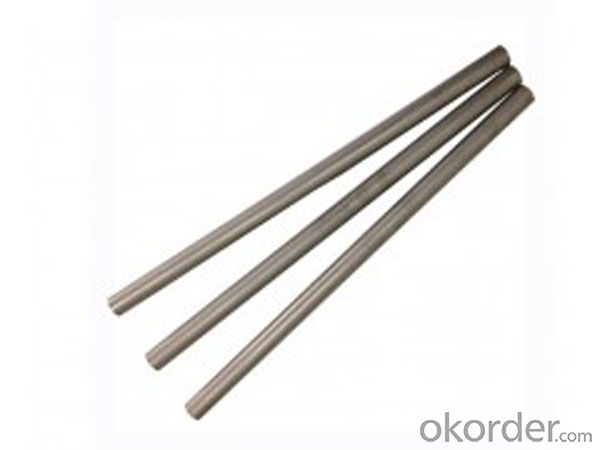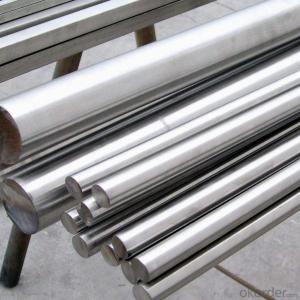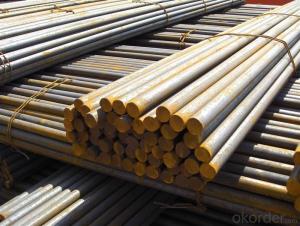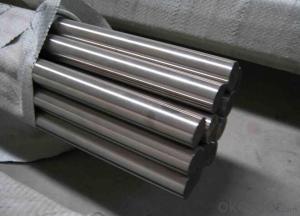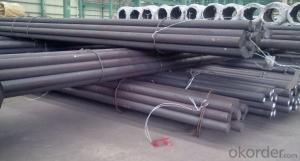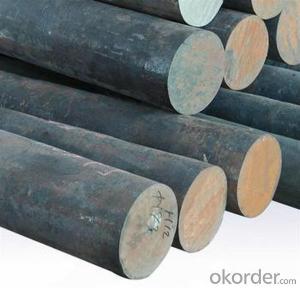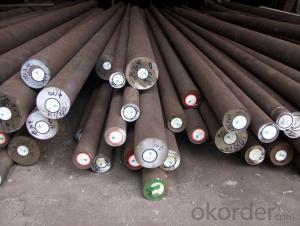Special Steel NAK80 Steel Round Bar Alloy Steel
- Loading Port:
- China main port
- Payment Terms:
- TT OR LC
- Min Order Qty:
- 30 m.t.
- Supply Capability:
- 10000 m.t./month
OKorder Service Pledge
OKorder Financial Service
You Might Also Like
Specification
Special Steel NAK80 Steel Round Bar Alloy Steel
Product Information:
1. Hardness:Hardened hardness: HRC=37~43
2.Size specification
l Thickness: 20~300MM
l Width: 205~2000MM
l Length: 2000~5800MM
l Round bar: 30~350MM
And we can also provide the size as you required.
3. Surface condition: Black surface / Grinding / Polishing / Milling / Machined……
4. shape:flat / round bar / square bar / sheet / plate ……
5. Process: EAF + LF + VD + HOT ROLLED + Heat Treatment (optional)
6. Heat treatment: Normalized / Annealed / Quenched / tempered
7. Technical Data: According to the customer's requirement of Chemical Composition, Physical Properties and Mechanical Testing
8. Inspection: Ultrasonic test according to SEP 1921-84 Gr3, Class C/c or D/d
9. Delivery condition:
l Hot rolled or forging
l Black surface / Grinding / Polishing / Milling / Machined
l Hardened & tempering & annealing
l EAF or ESR material
10. Payment terms:
30% advance by T\T; Balance pay before the shipment against shipping documents or irrevocable LC at sight
11. Delivery time: 3-15 days after advanced payment
12. Material character:
l Low alloy separate out induration steel
l Good mechanical property after the heat-treatment
l High quenching
l The heat-treatment technology is very simple
l Small distortion and nice mirror process under the heat-treatment
l Good nitrogenated capacity, electronic capacity, welding capacity
l Strong good flower pattern engraving capacity and so on
Product Overviews:
| Product Name | Typical Grades | Diameter(mm) | Standard adopted |
| Carbon Steel | 20 (1020/S20C/C22) | Ø16-Ø300 | GB/SAE/JIS/DIN |
| 40 (1040/S40C/C40) | |||
| 45 (1045/S45C/C45) | |||
| Bearing Steel | GCr9 (51100/SUJ1) | Ø12-Ø250 | |
| GCr15 (52100/SUJ2/100Gr6) | |||
| GCr9SiMn (A485-Gr.1/SUJ3) | |||
| Cr-Mo Steel | 20Cr (5120/SCr420H/20Cr4) | Ø12-Ø250 | |
| 40Cr (5140/SCr440/41Cr4) | |||
| 42CrMo(4140/SCM440/42CrMo4) | |||
| Gear Steel | 20CrNiMo | Ø16-Ø600 | |
| 20CrMn(5115/SMnC420/20MnCr5) | |||
| 20CrNiMo(8620/SNCM220/20CrMiMo2) |
Product Show:

Our Advantages:
· Industry experience over 20 years.
· Shipment of goods -More than 70 countries worldwide.
· The most convenient transport and prompt delivery.
· Competitive price with best service.
· High technical production line with top quality products.
· High reputation based on best quality products.
With our experienced, enthusiastic and dynamic staffs, we assure to bring you the products with best quality, reasonable prices and good after-sales services under the motto: Friends First, Business After.
Communication, Experience, Expertise and Best efforts are our Promises to you.
- Q: What are the properties of leaded steel?
- Leaded steel is a type of steel that contains a small amount of lead, typically between 0.15% to 0.35% by weight. The addition of lead improves the machinability of the steel, making it easier to cut and shape. Leaded steel also has excellent lubricity, reducing friction and wear during machining operations. However, it is important to note that leaded steel may have reduced mechanical properties such as strength and toughness compared to non-leaded steels. Additionally, the presence of lead can have environmental and health implications, so proper handling and disposal measures need to be taken.
- Q: What are the factors to consider when selecting special steel for a specific application?
- When selecting special steel for a specific application, some important factors to consider include the required strength and hardness, corrosion resistance, temperature resistance, machinability, weldability, and cost. Other factors may include the desired surface finish, dimensional stability, availability, and any specific industry or regulatory requirements.
- Q: How is special steel produced?
- Special steel is typically produced through a combination of several processes, including melting, refining, casting, and heat treatment. It involves carefully selecting and blending various alloying elements to achieve desired chemical and mechanical properties. These elements are added to molten steel, which is then refined to remove impurities. The refined steel is then cast into various shapes and forms, such as bars, sheets, or tubes. Finally, the steel undergoes heat treatment processes like tempering or quenching to further enhance its strength and other properties.
- Q: How is special steel used in the production of valves and fittings?
- Special steel is commonly used in the production of valves and fittings due to its high strength, corrosion resistance, and ability to withstand extreme temperatures and pressure conditions. It provides durability and reliability, ensuring the efficient functioning of valves and fittings in various industries such as oil and gas, petrochemical, and power generation. Additionally, special steel's malleability allows for intricate shaping and precision manufacturing, enabling the production of valves and fittings with complex designs and tight tolerances.
- Q: How does special steel contribute to the aerospace material recyclability?
- Special steel contributes to the aerospace material recyclability by offering high durability and strength, making it a preferred material for various aircraft components. Its recyclability is enhanced through processes such as melting and reformation, allowing the steel to be reused in new applications. This reduces the need for new steel production, conserves resources, and minimizes waste generation in the aerospace industry.
- Q: How does special steel contribute to reducing product waste?
- Special steel contributes to reducing product waste by offering enhanced durability and strength. This allows manufacturers to produce longer-lasting and more reliable products, minimizing the need for frequent replacements or repairs. By using special steel, products can withstand harsh conditions, wear and tear, and stress, resulting in reduced waste as they have a longer lifespan. Additionally, special steel's superior properties enable the production of lighter and more efficient components, leading to reduced material consumption and waste during the manufacturing process.
- Q: What are the different coating techniques used for special steel?
- There are several different coating techniques used for special steel, including hot-dip galvanizing, electroplating, powder coating, and thermal spraying. Each technique has its own advantages and applications, providing enhanced protection against corrosion, improved aesthetics, or increased durability depending on the specific requirements of the steel.
- Q: What are the different methods of surface pickling for special steel?
- There are several methods of surface pickling that can be used for special steel. These methods include: 1. Acid Pickling: This is the most common method used for pickling special steel. It involves immersing the steel in an acid solution, usually hydrochloric acid or sulfuric acid, to remove any surface impurities. The acid reacts with the oxide layer on the steel, dissolving it and leaving behind a clean surface. 2. Electrolytic Pickling: In this method, an electric current is passed through the steel while it is immersed in an electrolyte solution. This causes a chemical reaction that removes the surface impurities. Electrolytic pickling is a more controlled process and can be used to achieve a more uniform surface finish compared to acid pickling. 3. Mechanical Pickling: This method involves using mechanical means to remove the surface impurities from the steel. It can be done using abrasive materials, such as sandpaper or wire brushes, to physically scrub the surface and remove any scale or rust. Mechanical pickling is often used in combination with acid or electrolytic pickling to achieve the desired surface finish. 4. Passivation: After pickling, special steel can undergo passivation to enhance its corrosion resistance. Passivation involves treating the steel with a chemical solution, typically nitric acid or citric acid, to create a protective oxide layer on the surface. This layer helps to prevent further corrosion and improves the overall durability of the steel. It is important to note that the specific method of surface pickling used for special steel may vary depending on the type of steel, the desired surface finish, and the intended application. Therefore, it is crucial to consult with experts or follow the manufacturer's guidelines to ensure the appropriate method is used for pickling special steel.
- Q: What are the properties of ultra-high-strength steel?
- Ultra-high-strength steel possesses exceptional mechanical properties, including high tensile strength, excellent toughness, and superior fatigue resistance. It exhibits high stiffness, enabling it to withstand heavy loads and maintain its shape even under extreme conditions. With its low weight and high strength-to-weight ratio, this steel offers enhanced fuel efficiency and increased payload capacity. Additionally, it exhibits good weldability, corrosion resistance, and is often used in applications where both strength and durability are paramount, such as in automotive, aerospace, and construction industries.
- Q: How is special steel used in the aerospace supply chain?
- Special steel is used in the aerospace supply chain for various critical applications. It is primarily used for manufacturing aircraft components such as engine parts, landing gears, and structural components. The high strength, durability, and corrosion resistance of special steel make it ideal for withstanding the demanding conditions and extreme temperatures experienced during flight. Additionally, special steel's unique properties allow for lightweight designs, improving fuel efficiency and overall aircraft performance.
Send your message to us
Special Steel NAK80 Steel Round Bar Alloy Steel
- Loading Port:
- China main port
- Payment Terms:
- TT OR LC
- Min Order Qty:
- 30 m.t.
- Supply Capability:
- 10000 m.t./month
OKorder Service Pledge
OKorder Financial Service
Similar products
Hot products
Hot Searches
Related keywords
